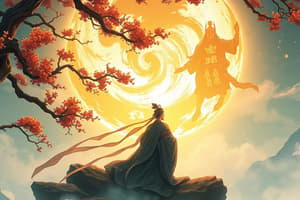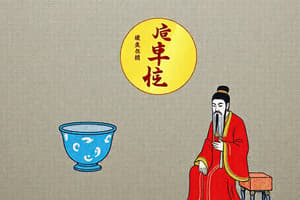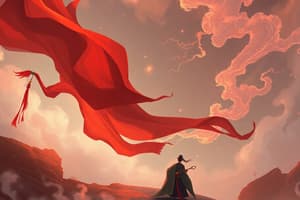Podcast
Questions and Answers
Lao Zi is considered a myth due to the lack of evidence supporting his existence.
Lao Zi is considered a myth due to the lack of evidence supporting his existence.
True (A)
The Dao De Jing contains a total of 81 chapters and consists of 4,500 characters.
The Dao De Jing contains a total of 81 chapters and consists of 4,500 characters.
False (B)
Daoism and Confucianism both represent fundamentally different religious philosophies.
Daoism and Confucianism both represent fundamentally different religious philosophies.
False (B)
Wu Wei, meaning non-action, emphasizes the importance of constant activity in Taoist spirituality.
Wu Wei, meaning non-action, emphasizes the importance of constant activity in Taoist spirituality.
The term 'Dao' can refer to concepts such as Truth, Nature, and the Way.
The term 'Dao' can refer to concepts such as Truth, Nature, and the Way.
The teachings attributed to Lao Zi drew millions of followers primarily due to their emphasis on strict rituals and worship of deities.
The teachings attributed to Lao Zi drew millions of followers primarily due to their emphasis on strict rituals and worship of deities.
According to the traditional story, Lao Zi served as a custodian in the Imperial Archives.
According to the traditional story, Lao Zi served as a custodian in the Imperial Archives.
Confucianism was founded by the philosopher Lao Zi.
Confucianism was founded by the philosopher Lao Zi.
Filial piety is considered the least important virtue in Confucianism.
Filial piety is considered the least important virtue in Confucianism.
The Golden Rule in Confucianism suggests treating others in a manner you wouldn't want to be treated.
The Golden Rule in Confucianism suggests treating others in a manner you wouldn't want to be treated.
Taoism is also known as Daoism and emphasizes the way of the universe.
Taoism is also known as Daoism and emphasizes the way of the universe.
The teachings of Confucius primarily concern the spiritual and metaphysical aspects of life.
The teachings of Confucius primarily concern the spiritual and metaphysical aspects of life.
There are five cardinal relationships in Confucianism that help create harmony in society.
There are five cardinal relationships in Confucianism that help create harmony in society.
The philosophy of Confucius was widely recognized during his lifetime, leading to his wealth and fame.
The philosophy of Confucius was widely recognized during his lifetime, leading to his wealth and fame.
Li in Confucianism encompasses love within the family and love for parents and children.
Li in Confucianism encompasses love within the family and love for parents and children.
Flashcards
Confucianism
Confucianism
An ancient Chinese belief system emphasizing personal ethics, morality, and ancestor worship for a peaceful life.
Confucius
Confucius
The founder of Confucianism, an ancient Chinese philosopher and teacher (551-479 BCE).
Filial Piety
Filial Piety
Respect for parents, a core Confucian concept emphasizing family harmony.
Li (ritual)
Li (ritual)
Signup and view all the flashcards
Hsiao (love)
Hsiao (love)
Signup and view all the flashcards
Yi (righteousness)
Yi (righteousness)
Signup and view all the flashcards
Jen (benevolence)
Jen (benevolence)
Signup and view all the flashcards
Taoism (Daoism)
Taoism (Daoism)
Signup and view all the flashcards
Lao Zi
Lao Zi
Signup and view all the flashcards
Tao/Dao
Tao/Dao
Signup and view all the flashcards
Tao Te Ching
Tao Te Ching
Signup and view all the flashcards
Wu Wei
Wu Wei
Signup and view all the flashcards
Metaphysical
Metaphysical
Signup and view all the flashcards
Mysticism
Mysticism
Signup and view all the flashcards
Confucius
Confucius
Signup and view all the flashcards
Study Notes
Confucianism
- Ancient Chinese belief system emphasizing personal ethics and morality
- Focuses on ancestor worship and human-centered virtues for peaceful living
- Golden Rule: "Do not do unto others what you would not want others to do unto you."
- Often called "the school of the scholars"
- Founded by Confucius (551-479 BCE), a philosopher and teacher
- Confucius's teachings on ethics, behavior, and morality were documented by his disciples
- Confucius was an itinerant teacher (traveled from place to place)
- Social harmony based on predetermined social roles: father/son, brother/brother, husband/wife, ruler/subject, friend/friend
- Filial piety (respect for parents) is the most important Confucian virtue; respect for parents is critical for a successful life
Key Confucian Virtues
- Li: ritual, propriety, etiquette
- Hsiao: love within the family (love between parents and children)
- Yi: righteousness
- Xin: honesty and trustworthiness
- Jen: benevolence, humaneness (highest virtue)
- Chung: loyalty to the state
Taoism (Daoism)
- Also known as Daoism; a Chinese religion and philosophical teaching
- "Tao" means "way"/the way of the universe
- Based on the teachings of Lao Zi (also known as Lao Tzu), considered a Chinese sage
- One of the world's most famous religions
- Differs from Confucianism, focusing more on the metaphysical world and the hereafter.
- Confucius focuses on mundane world, and conscientious leadership/good citizenship/benevolent families
- Taoism focuses on harmonious living with the natural world/mysticism; seeks unity with nature/spiritual world
Taoism (Daoism) - Lao Zi
- Lao Zi's life (566-470 BCE): traditionally thought to be symbolic/legendary figure. (May be historical or not)
- From Chu (Hunan province) initially a governmental official/custodian of imperial archives
- Retired to the West and wrote the Dao De Jing (Tao Te Ching)
- Lao Zi's teachings faded and were incorporated into a religion with deity worship and rituals performed by priests
- Taoism/Daoism beliefs have adapted over time; evolving from philosophy to religion
Dao De Jing (Tao Te Ching)
- An ancient Chinese text (5,250 characters) attributed to Lao Zi
- Divided into 81 poems
- Second most translated book in English after the Bible
- Significant concepts:
- Dao: Truth, the absolute, nature, the way of nature, the way
- Dao is non-being, but the source of all being
- Concept of Wu Wei: Non-action/non-purposiveness—living in harmony with the natural order; an essential element of Taoist spirituality and a concept about how to connect with the Dao
Studying That Suits You
Use AI to generate personalized quizzes and flashcards to suit your learning preferences.




